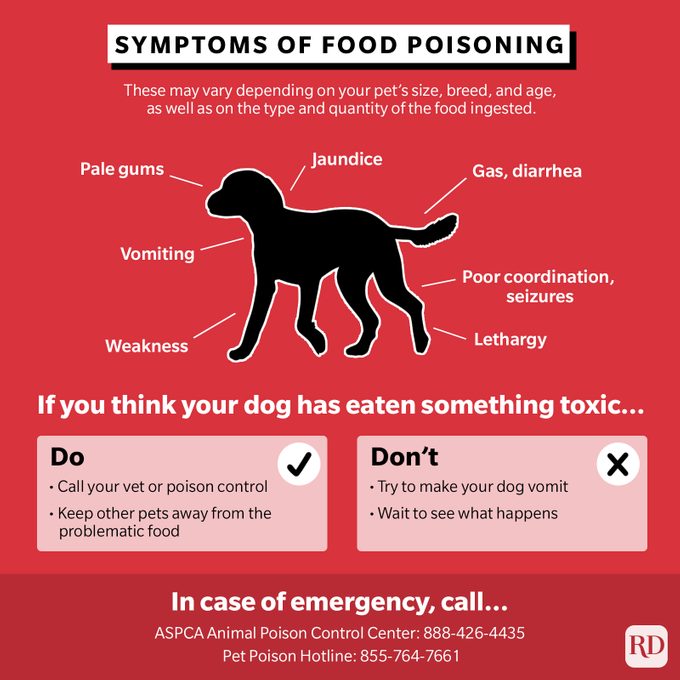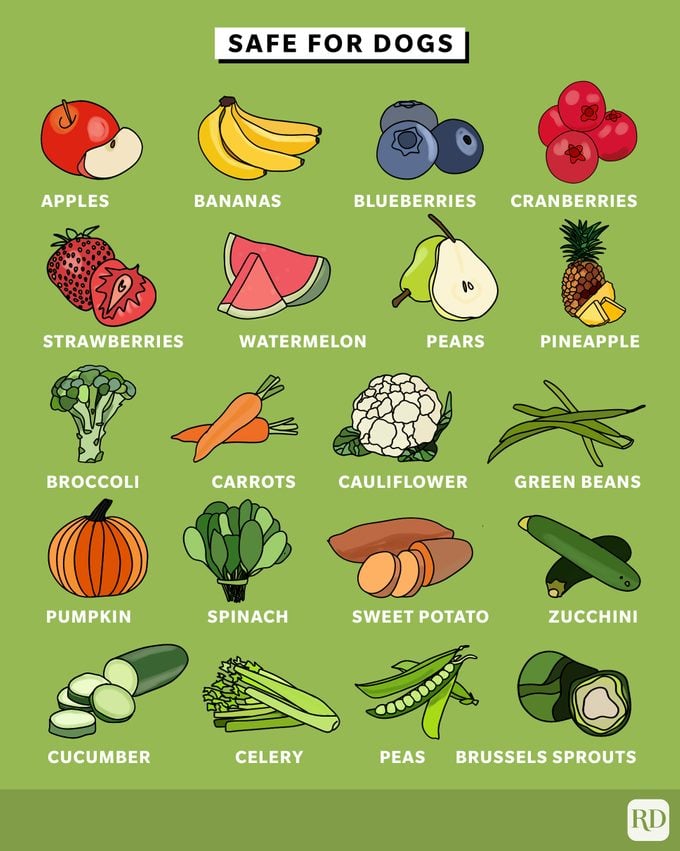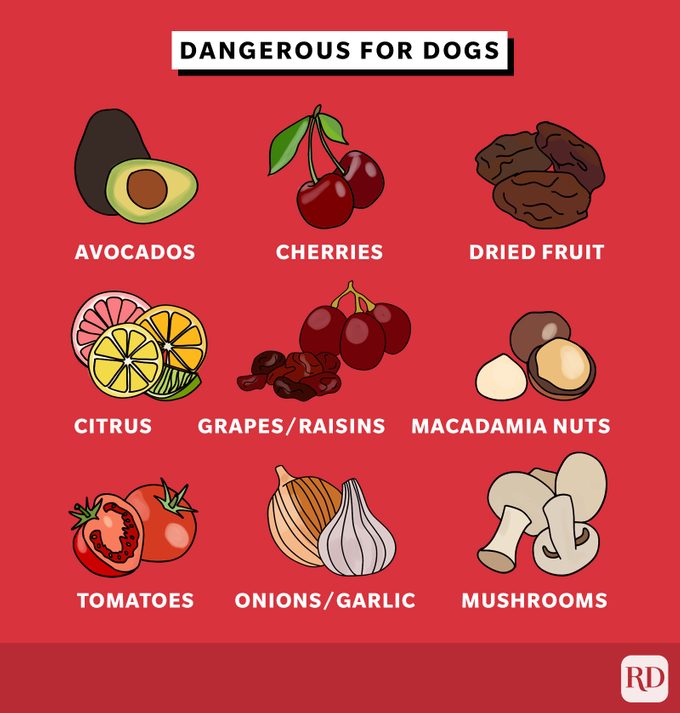We all know we should eat our fruits and veggies, but what's good for us isn't always good for our dogs.
Most of us are guilty of slipping our furry friends some people food now and then. And if your dog could stand to lose a few pounds or you just want to keep him healthy and spry, you may have even considered supplementing his diet with a little fruit or vegetables. Here’s the good news: There are plenty of human foods dogs can eat. And now for the bad news: There are also plenty of human foods that dogs can’t eat—and definitely shouldn’t. But just because it grows on a tree, bush, or vine doesn’t mean it’s good for your dog. So before you give in to those sweet puppy-dog eyes when your furry friend is begging for a taste of your meal, make sure you’re aware of what fruits and vegetables dogs can eat.
We asked veterinarians to share their expertise on which foods are safe for dogs and which could have adverse—and even deadly—side effects. For example, can dogs eat bananas? What about blueberries and grapes? We have the answers that will help you avoid an emergency and could also shed some light as to why your dog isn’t eating. (Hint: Something else could have made him lose his appetite!)
The fruits dogs can eat
A little fruit here and there is a sweet treat for your pup, and some fruits are actually beneficial to your dog’s diet. But moderation is the key because most fruits are high in sugar, says Shawna Garner, DVM, U.S. lead veterinarian at FirstVet, an on-demand video consultation platform. “The best way to make sure that dogs get the nutrition they need is to feed them a nutritionally complete, commercial pet food as the basis of their diet,” says Dr. Garner. “Any other food should be given as a small treat or topping to their meals. Roughly a tablespoon of fruit or vegetables per day should be enough for a medium-sized dog.”
That said, some caveats prevail. “Avoid giving fruits, with their high natural sugar content, to a diabetic dog,” says Lisa Weeth, DVM, head of the nutrition department at Metropolitan Animal Specialty Hospital. “These foods can interfere with their blood sugar regulation.”
As long as your dog doesn’t have a specific medical issue or food allergy, these are some of the fruits dogs can eat:
Apples: Apples of all varieties make good treats for dogs, Dr. Garner says, because they’re an excellent source of vitamin C, fiber, and calcium. “Make sure to cut them up and remove the core before serving,” she adds, “as apple seeds can cause dogs to have an upset stomach when eaten in large quantities.”
Bananas: Potassium-rich bananas are a safe treat for dogs, but they should be doled out in small portions due to their high sugar content. “They may cause your dog to gain weight if they eat too much,” notes Dr. Garner.
Blueberries: According to Dr. Garner, this antioxidant- and fiber-rich snack can help keep dogs in good shape. Blueberries are also among the possible cancer-fighting foods for dogs.
Cranberries: It turns out that cranberries have some of the same benefits for dogs as they do for humans. “Cranberry supplements are thought to reduce the adhesion of bacteria in the urogenital tract and possibly prevent urinary tract infections,” says Stacy Choczynski Johnson, DVM, the vet expert at Pumpkin Pet Insurance. While some dogs may not like the sour taste, tossing your pup a couple of fresh or dried cranberries is fine from a safety perspective.
Your dog can also say “bone appétit” (see what we did there?) to small amounts of strawberries, watermelon, pears, and pineapple. Dr. Weeth adds that frozen fruit juice cubes or apple sauce cups can be fun summertime treats for your pup, as long as they’re doled out in limited servings. Interested in making your own snacks for your dog? Check out these homemade dog treats your pet will love.
The vegetables dogs can eat
Most vegetables make a good treat for your pet, says Jamie Richardson, DVM, medical chief of staff at Small Door Veterinary in New York City. But if you’re giving table scraps, make sure the vegetables don’t include much in the way of butter, salt, or other seasonings, she says. And just like fruit, when it comes to vegetables, a little bit goes a long way in your dog’s diet, so there’s no need to overdo it. One important note: With any raw or crunchy vegetables, be sure to cut them up into small, bite-sized pieces to avoid the risk of choking.
Here are some vegetables dogs can eat in small portions:
Broccoli: Raw or steamed, bite-sized pieces of broccoli are a good source of vitamins A, C, and K, as well as beta-carotene, folate, and dietary fiber.
Carrots: Both raw or cooked carrots get a thumbs-up from vets. “Their natural sweetness makes them appealing to canines,” says Dr. Garner. “Plus, they contain high amounts of vitamin A, which helps to boost their immune system and keeps their skin and coat healthy.” Here’s another bonus: Unlike many other vegetables, carrots don’t tend to give dogs gas!
Cauliflower: Like broccoli, cruciferous cauliflower is full of vitamins and minerals, and it may help the aches and pains of older pets with arthritis. Speaking of cauliflower, it also made this list of the trending superfood veggies that could be the next kale (for humans, that is), so you may want to stock up!
Green beans: “With ample amounts of plant fiber, manganese, and vitamins C and K, plain green beans are great for dogs,” says Gary Richter, DVM, a veterinary health expert with Rover.com. Dr. Garner seconds that, noting that dogs can eat green beans cooked or raw. When frozen, she adds, they make a great treat on a warm summer day.
Pumpkin: Pumpkin’s high fiber content can be beneficial for dogs that have diarrhea or constipation, says Dr. Garner. “However,” she adds, “pumpkin should only be served to dogs cooked, without added spices or flavors, to avoid upsetting a dog’s stomach.”
Spinach: If your dog will eat it, spinach is a great source of vitamin K, magnesium, folate, manganese, omega-3 fatty acids, and zinc, says Oscar E. Chavez, BVetMed, Chief Medical Officer at Just Food for Dogs.
Sweet potatoes: Another great source of dietary fiber, sweet potatoes are high in vitamin B6, vitamin C, and beta-carotene. Sweet potatoes should be peeled and cooked—or you can pick up some dehydrated sweet potato dog chews. In case you were wondering, these are the best dog food brands that veterinarians feed their own pets.
Zucchini: “An excellent source of vitamin C, zucchini is also rich in beta-carotene and is a source of vitamin A, dietary fiber, potassium, folate, and niacin,” says Dr. Chavez.
What other veggies can dogs chow down on in moderation? Cucumbers, celery, peas, and Brussels sprouts.
The fruits dogs can’t eat
The fruits and vegetables that dogs can eat won’t do any harm and may even help their health. But the list of fruits and vegetables that dogs can’t eat is actually kind of scary—some of the items can make them quite ill and, if unaddressed, could even be deadly. Some are bite-sized, sweet fruits that you and your dog might view as treats, so be aware before you toss one to your faithful companion. The list of fruits to avoid includes:
Avocados: Yes, they’re a fruit, and no, your dog shouldn’t eat them. Avocados contain persin, a toxin that can cause vomiting and diarrhea. “It’s particularly concentrated in the skin of the avocado, although any part of the fruit is unsafe for dogs to eat,” says Dr. Garner. Avocados are also very high in fat, notes Dr. Richter, so in addition to their toxic capabilities, they can cause gastrointestinal upset if ingested in large amounts. In general, you should be on the lookout for these signs of dog illness in your seemingly healthy pet.
Cherries: The pit and skin of cherries contain small amounts of cyanide, says Dr. Garner. So if your dog gets ahold of a whole bowl of cherries, he can be poisoned. “If a dog eats a whole cherry, this may cause an upset stomach,” says Dr. Garner. “However, several cherries could lead to breathing difficulties and an unwanted emergency visit to the vet.”
Citrus: A section of orange or tangerine may be safe to feed your dog, but watch out for the rest of the fruit. “Other parts of the plant, including the leaves, stem, skin, and leaves are toxic,” says Dr. Garner. “If consumed, they can cause an upset stomach, and vomiting and diarrhea if consumed in large amounts.”
Dried fruit: With the exception of a couple of dried cranberries (see above), dried fruit is generally a no-no for dogs. While none has the toxicity of raisins, dried fruit is high in sugar, which makes it an unhealthy snack. “You’re better off choosing fresh fruit alternatives,” Dr. Garner says, “as long as they are safe for dogs to eat.”
Grapes and raisins: Dr. Richter says that grapes and raisins can cause kidney toxicity in some dogs. “The effect is not dose-dependent,” he adds, “so even a single grape or raisin can potentially be fatal.” While fatalities are rare, if you know your dog has eaten grapes or raisins, take him to the vet ASAP. Here’s how to tell if your dog has food poisoning.
Macadamia nuts: Nuts are generally not a good snack for dogs due to their high-fat content; plus, packaged nuts are often packed with salt. But macadamia nuts are particularly problematic because they can cause weakness, vomiting, and diarrhea in dogs. While these symptoms will usually resolve on their own, Dr. Garner says it’s still a good idea to call your veterinarian if your dog gets ahold of these nuts.
Tomatoes: Yep, they’re also a fruit! And like other fruits and vegetables in the nightshade family, tomatoes contain solanine, which, when ingested in large amounts, can cause GI distress and arrhythmia in dogs. The good news is that ripe tomatoes contain far less solanine than green ones, so a piece of ripe tomato is probably OK for your dog. But absolutely keep him away from green tomatoes and tomato leaves and stems, where solanine is concentrated.
The vegetables dogs can’t eat
When it comes to most vegetables, the biggest risk to your dog (and you) is that he’ll get an upset tummy, be gassy, or have diarrhea after ingesting them. But a few vegetables are especially toxic to dogs, though in most cases, they’d have to ingest them in large amounts to do any real damage. These include:
Onions: Foods from the onion family—including onions, garlic, leeks, and chives—should be avoided because they contain a toxin called N-propyl disulfide. “This can cause serious damage to canine red blood cells, meaning that the dog’s body will struggle to distribute oxygen properly,” says Dr. Garner. “It is never safe to give a dog onion or any other foods from the onion family.”
Dr. Richter concurs. “Onion toxicity is rare because most dogs wouldn’t eat enough onions to be a problem,” he says. “But theoretically, if someone had a large plate of cooked onions that got eaten by the dog, it could be a problem.” You should be on particularly high alert during holidays. For example, think of all the Thanksgiving foods that incorporate cooked onions and could pose a danger to your pet.
And Dr. Weeth adds a special note of caution: “A 50-pound dog sneaking a few licks of a sauce that includes garlic and onion are unlikely to cause any issues, but adding garlic to their diet as an additive or in a supplement over days to weeks can cause nausea or vomiting and result in anemia. If the anemia becomes severe enough and chronic enough, it can cause lethargy, weakness, pale gums, and collapse. There are many in the blogosphere who still tout unproven health ‘benefits’ for garlic while ignoring the very real negative health risks of this food. I would not recommend intentionally feeding anything in the garlic or onion family to dogs.”
Mushrooms: If you and your dog take a walk through the woods, or anywhere wild mushrooms might pop up, make sure he doesn’t chomp on one while he has his nose to the ground. “Store-bought shouldn’t be hazardous,” says Dr. Garner, “but it’s best to avoid mushrooms altogether when it comes to a dog’s diet.” Here are more shockingly common dog dangers in your own backyard.

Sources:
- Shawna Garner, DVM, U.S. lead veterinarian at FirstVet
- Lisa Weeth, DVM, head of the nutrition department at Metropolitan Animal Specialty Hospital
- Stacy Choczynski Johnson, the vet expert at Pumpkin Pet Insurance
- Jamie Richardson, DVM, medical chief of staff at Small Door Veterinary
- Gary Richter, DVM, a veterinary health expert with Rover
- Oscar E. Chavez, BVetMed, Chief Medical Officer at Just Food for Dogs
Popular Videos
What Fruits and Vegetables Can Dogs Eat? | Food Safety for Pets - Reader's Digest
Read More



No comments:
Post a Comment